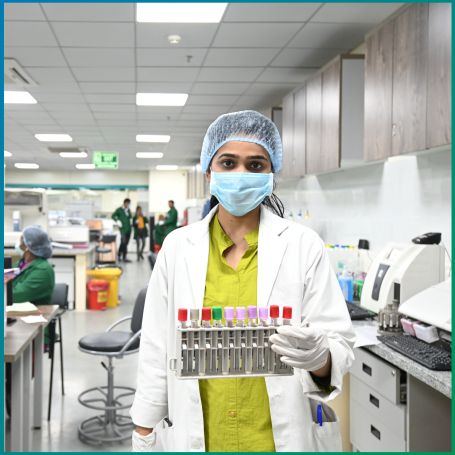
Gastric Aspirate Examination is a diagnostic test used to analyze stomach fluid for the presence of infections, such as tuberculosis, or other abnormalities.


A gastric aspirate examination involves collecting a sample of stomach fluid, or gastric aspirate, through a thin, flexible tube (nasogastric tube) inserted into the stomach. The sample is then analyzed for various pathogens, cells, or abnormalities, helping physicians diagnose specific conditions.
Diagnosis of Tuberculosis (TB)
Gastric Aspirate for TB: Gastric aspirate examination is especially useful in diagnosing pulmonary tuberculosis in children, as they often cannot produce a sputum sample for analysis. The sample can detect Mycobacterium tuberculosis, the bacterium that causes TB when analyzed with techniques like AFB (Acid-Fast Bacillus) staining and GeneXpert.
Gastric Aspirate for GeneXpert
GeneXpert is a molecular test that detects TB bacteria and resistance to certain medications. This test can be performed on gastric aspirate samples and provides results faster than traditional methods, with high sensitivity.
Detection of Other Respiratory Infections
For patients unable to provide respiratory samples, the gastric aspirate test can help detect other respiratory infections by culturing the bacteria or viruses from stomach fluid.
The procedure involves several steps:
Preparation:
The patient is asked to fast overnight to ensure the stomach is empty. This reduces the risk of contamination and enhances the accuracy of the results.
Insertion of the Nasogastric Tube:
A thin, sterile nasogastric tube is inserted through the nose and advanced to the stomach. This may cause temporary discomfort but is generally well-tolerated.
Collection of the Sample:
The healthcare professional will use a syringe to aspirate, or draw, a sample of the stomach fluid through the tube. Sometimes a small amount of saline is added to the stomach to increase the sample volume.
Sample Processing:
The sample is then sent to the laboratory for analysis. For TB diagnosis, the sample undergoes an AFB procedure or GeneXpert testing to detect Mycobacterium tuberculosis.
The AFB (Acid-Fast Bacillus) procedure is a staining technique used to detect mycobacteria, particularly Mycobacterium tuberculosis, in samples like gastric aspirates.
Sample Staining: The sample is stained with specific dyes, which color the tuberculosis bacteria.
Microscopic Examination: Under a microscope, a trained technician examines the stained sample for the presence of TB bacilli.
Results Interpretation: If AFB is detected, it suggests a tuberculosis infection, prompting further testing or immediate treatment.
Gastric aspirate testing is especially important in diagnosing TB in:
Children who cannot provide a sputum sample.
Patients with severe respiratory issues who have difficulty expectorating.
Cases where other TB tests (such as skin or blood tests) may be inconclusive.
Proper handling of gastric aspirate samples is crucial:
Time Sensitivity: Samples should be processed as soon as possible after collection, ideally within 4 hours.
Temperature Control: If immediate processing isn’t possible, refrigerating the sample may help preserve it.
Normal Results: A gastric aspirate test result without any pathogens indicates a normal finding. For TB, a negative result implies no detectable presence of Mycobacterium tuberculosis.
Abnormal Results: A positive result, such as detection of AFB or TB through GeneXpert, indicates infection requiring medical intervention. Other abnormalities may suggest the presence of additional gastrointestinal or respiratory infections.
Diagnopein Diagnostic Center in Pune offers several advantages for gastric aspirate testing:
A) NABL-Certified Laboratory: Diagnopein’s NABL-accredited labs ensure high standards, accuracy, and reliability in testing.
B) Advanced Technology: We utilize the latest diagnostic technology, including GeneXpert for TB, which provides rapid and accurate results.
C) Experienced Professionals: Our experienced lab technicians are trained in handling sensitive samples, ensuring the quality and integrity of test results.
D) Comprehensive Analysis: We provide a range of testing options for gastric aspirates, from AFB staining to molecular testing, covering a variety of pathogens.
E) Affordable Testing: Diagnopein offers competitive pricing, making essential diagnostic tests accessible and affordable for patients.
Clean and Hygienic Environment: We prioritize patient comfort and maintain high hygiene standards to ensure a safe experience.
This test is used to diagnose infections, especially TB, by analyzing stomach contents. It’s beneficial for patients who cannot provide respiratory samples.
The sample collection itself takes only a few minutes, but the processing time for test results may vary. GeneXpert testing for TB, for instance, typically provides results within a few hours.
While it may cause slight discomfort as the tube is inserted, the process is generally painless and well-tolerated.
Patients are advised to fast overnight to ensure an accurate sample is collected.
A positive result for AFB or GeneXpert indicates a likely TB infection, requiring further medical intervention.
Yes, aside from TB, it can help detect other bacterial or viral respiratory infections when cultured.